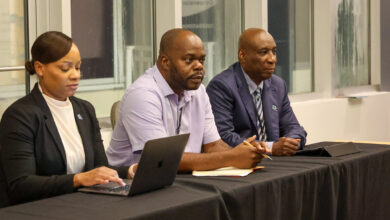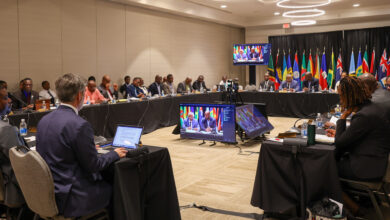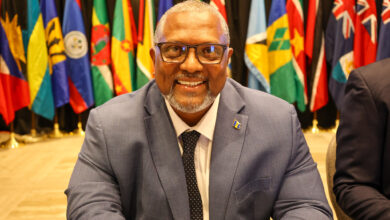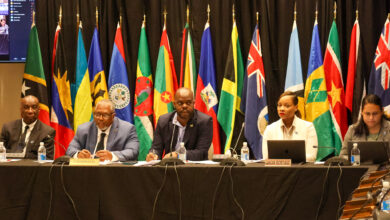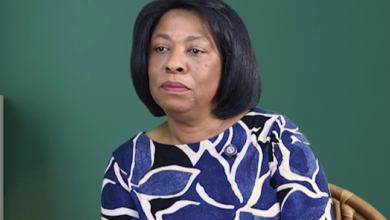(CARICOM Secretariat, Turkeyen, Greater Georgetown, Guyana) The Council on Trade and Economic Development (COTED) concluded its 22nd meeting in Georgetown on Friday having removed longstanding items from its agenda and significantly advancing others.
At an end-of-COTED press conference at Le Meridien Pegasus Friday evening, Council Chairman, Honourable Eamon Courtenay listed among the more intense discussions over the two days, issues relating to:
• the CARICOM Single Market and Economy with specific reference to eliminating restrictions on the free movement of persons and trade in goods;
• sustainable development;
• the inclusion of a development chapter in the Economic Partnership Agreement (EPA) with the European Union;
• transportation; and,
• the establishment of the CARICOM Development Fund (CDF) and Regional Development Agency (RDA).
Mr. Courtenay, the Belizean Minister of Foreign Affairs and Foreign Trade said significant time was spent discussing the free movement of the approved categories of persons, as well as the free movement of nationals in general. Discussions were also held on the movement of all Member States towards a common passport, which is “vitally important to allow members of our community to move freely around the Community.” With regard to the removal of restrictions on the trade in goods, Minister Courtenay reported on the suspension of the Common External Tariff (CET) for some Member States which wanted to import goods from out of the Region.
The Council placed particular emphasis on sustainable development and climate change which impacted on the Region in a very “dramatic way”. The Region, Mr. Courtenay warned, must take a more pro-active approach to the two issues and must position itself to make predictions and conduct hazard-mapping. Minister of State at the Ministry of Foreign Affairs and Foreign Trade, Barbados, Hon. Kerrie Simmonds added that climate change concerned the community as a whole, especially within the context of the coastal economies, and the impact of the phenomenon on coral reefs, tides, and coastal investments.
“…we need to have a greater degree of resource commitment to the Caribbean Community Climate Change Centre (in Belize); there needs to be a greater recognition that that is perhaps one of the most fundamental areas of our regional endeavour in terms of developmental focus, and I think that this COTED has sent a very strong and urgent message to the Heads of Government that this is something that we would want them to address very seriously,” Minister Simmonds said.
With regard to the EPA – the successor to the Cotonou Agreement – Minister Courtenay reported that there was consensus on the need to insert into the EPA a separate chapter on development. He said there was political will in the EU to structure the EPA in a manner that places development at the forefront, but there was a difficulty in moving that commitment to the negotiating table. Pointing to the critical need to “get it right”, the Minister said that there were important meetings in Brussels next week to take stock of negotiations for 2006 and plans for negotiations next year.
“We regard the Economic Partnership Agreement as more than a trade agreement but a partnership agreement that would redound to the development and benefit of the CARICOM nationals,” Mr. Courtenay said.
Jamaican Minister of Foreign Affairs and Foreign Trade, The Hon. Anthony Hylton added that the EPA must be “market building” rather than a “market opening exercise”
Under the broad topic of transportation, the Council also agreed on the need for a private sector-driven policy to make full use of the under-utilised capacity of the Region’s ports. Following the consideration of a report by a transportation consultant, COTED concluded that CARICOM member states were not producing enough goods and agricultural products to use the facilities at their disposal.
“We have to aggressively say to the private sector that this is a matter for you. Look at several Member States and see what possibilities there are for you to start moving additional goods, what opportunities are there to make investment to produce agricultural or other goods to move around the Region, because the infrastructure is there,” Minister Courtenay said.
The establishment of the CDF and RDA, Minister Courtenay said was premised on the need for the Least Developed Countries (LDCs) and those in a disadvantaged state to have access to development planning and resources to achieve economic development. The Council agreed on broad outlines on how the RDA should be structured and located.
“This is a matter of urgency to the Community and I think the measure of importance that we place on it in our deliberations was quite appropriate,” the Minister said.
Bilateral/external trade relations; Competition Commission to provide redress monopolistic practices in the Region; relations with Central America; and engagement with Canada on a successor to CARIBCAN, were among the other issues the COTED addressed.
With Ministers Courtenay, Simmonds and Hylton at the press conference were Minister of Foreign Trade and International Cooperation, Guyana, Dr. the Honourable Henry Jeffrey, CARICOM Secretary General, His Excellency Edwin Carrington, Assistant Secretary General, Regional Trade and Economic Integration, His Excellency Irwin Larocque, and General Counsel (ag), CARICOM Secretariat, Mr. Neville Bissember.

